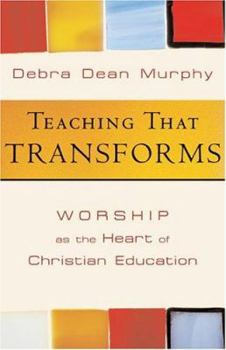Teaching That Transforms: Worship As the Heart of Christian Education
Select Format
Select Condition 
Book Overview
Wipf and Stock Publishers: By combining innovative technology with academic excellence we are able to produce affordable books of enduring value. Our books never go out of print, and building lasting... This description may be from another edition of this product.
Format:Paperback
Language:English
ISBN:1587430673
ISBN13:9781587430671
Release Date:January 2004
Publisher:Brazos Pr
Length:255 Pages
Weight:0.84 lbs.
Dimensions:8.3" x 0.8" x 5.5"
Customer Reviews
1 rating
Keen insights
Published by Thriftbooks.com User , 20 years ago
The connection between liturgy and learning is one that has long been of interest to me. One of the reasons church is increasingly irrelevant in the lives of many is the disconnect between what goes on there and what happens outside in the world. The sense of ministry of all the church to the world has been lost, and part of this is due to a lack of education taking place in the church. Debra Dean Murphy describes in the prologue the church in which she grew up where Sunday school rather than the 'preaching' part was the heart of the place - they were on a Methodist circuit where the minister wasn't able to attend each week. Even here, however, there was a sense of disconnect between the task of 'Christian education' and worship. Murphy argues for the use of the term 'catechesis' over 'Christian education' as it seems more connected, more 'integrally linked to worship, praise ad doxology' that constitutes the important part of Christian formation. Murphy edges away from some more 'traditional' senses of catechesis as rote memorisation of dogmatic statements toward a more wholistic idea of discipleship. Similarly, the term 'liturgy' is not a particular worship pattern, but rather the work of the whole people of God in worship in 'the identifiable, recognisable continuation of the historic forms of Word and Table.' Murphy argues that the liturgical renewal movement of the past generation helps recovery aspects that more minimalist, pietist Protestants have lost. In the first major section of this text, Murphy looks at the problems with religious education in the modern/postmodern world. Religious education, as a term and as a project, is ambiguous and problematic. 'To promote "religious education" in general, universal terms is to participate (however unwittingly) in the modern project of dissolving difference...' Problems also arrive with universals from the Enlightenment, such as freedom and justice, that these are self-evident truths that require no context or tradition. Looking at the ideas and constructs of Gabriel Moran, Thomas Groome and Mary Boys, Murphy accepts some of their intentions, but highlights the pitfall that they exist within the very structure they attempt to overthrow. The second major section looks at pedagogy in broad strokes laid out as a liturgical pattern. Much of the effort at education fails to take into account the powerful aspects of the church for catechesis, according to Murphy. Part of this goes to the epistemological question, how do we know what we know? It also gets to the pedagogical question, how do we learn what we learn? Murphy argues against the 'objectivist' model of learning as being too limiting and increasingly irrelevant for church life. Learning and formation takes place in worship when worship is intentional toward this purpose. The proclaimed word needs to call us into community, not simply transmit information for us to remember (or, more likely, forget). Prayer, ritual and sacraments help emb





